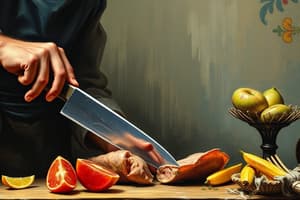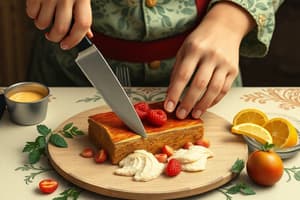Podcast
Questions and Answers
A boning knife is typically used for slicing cooked meat and poultry.
A boning knife is typically used for slicing cooked meat and poultry.
False (B)
A serrated knife is best suited for cutting hard vegetables like carrots.
A serrated knife is best suited for cutting hard vegetables like carrots.
False (B)
A paring knife is commonly used for peeling fruits and trimming herbs.
A paring knife is commonly used for peeling fruits and trimming herbs.
True (A)
A carving knife has a saw-like edge for cutting through tough meats.
A carving knife has a saw-like edge for cutting through tough meats.
A Santoku knife is an East-West hybrid knife with a curved blade.
A Santoku knife is an East-West hybrid knife with a curved blade.
Proper maintenance of knives involves keeping them wet and dirty after each use to prevent rust and bacterial growth.
Proper maintenance of knives involves keeping them wet and dirty after each use to prevent rust and bacterial growth.
Safety precautions when handling a knife include using a protective glove or cloth to avoid slipping and injuries.
Safety precautions when handling a knife include using a protective glove or cloth to avoid slipping and injuries.
Sharpening knives is not essential for maintaining their effectiveness over time.
Sharpening knives is not essential for maintaining their effectiveness over time.
Learning techniques like mincing, slicing, chopping, and julienning can limit your cooking options in the kitchen.
Learning techniques like mincing, slicing, chopping, and julienning can limit your cooking options in the kitchen.
The chef's knife is typically 6 inches long with a narrow blade.
The chef's knife is typically 6 inches long with a narrow blade.
Flashcards are hidden until you start studying
Study Notes
Knife Skills
Mastering knife skills is crucial for any cook. Whether you're preparing dinner for friends, working professionally in a restaurant, or just whipping up a quick snack, handling a knife safely and efficiently is essential. In this article, we'll delve into the various aspects of knife skills, including maintenance, safety, sharpening, techniques, and types of knives.
Maintenance
Maintenance involves keeping your knives clean and dry after each use to prevent rust and bacterial growth. Additionally, timely oiling and storing your knives properly can prolong their lifespan.
Safety
Safety precautions include always using a protective glove or cloth when handling a knife to avoid injury from slipping, maintaining a stable cutting surface, and keeping your fingers away from the blade's path.
Sharpening
Sharpening is crucial for maintaining the effectiveness of your knives. You can use sharpening stones, electric sharpener, or send them to specialized services for professional maintenance.
Techniques
Learning various techniques like mincing, slicing, chopping, and julienning helps expand your cooking options. Practice these skills to become proficient and efficient in the kitchen.
Types of Knives
Chef's Knife
The chef's knife, also known as the cook's knife, is typically 8 inches long with a broad blade. It's versatile, suitable for chopping, slicing, and mincing.
Paring Knife
A paring knife is small, often around 3-4 inches, making it ideal for intricate tasks such as peeling vegetables, trimming fruits, or cutting herbs.
Serrated Knife
Also called a bread knife, a serrated knife features a saw-like edge that effectively cuts through soft foods like bread and tomatoes.
Utility Knife
A utility knife, or a small chef's knife, is commonly used for general purpose, delicate tasks, and for cutting soft ingredients like mushrooms or shallots.
Boning/Filleting Knife
Boning knives and fillet knives are long, thin-bladed knives designed for cutting up raw meat, poultry, and fish.
Carving Knife
A carving knife is used for cutting cooked meat and poultry, with a long, narrow blade and a sharp tip for precision cutting.
Santoku Knife
The Santoku knife, an East-West hybrid, has a straight blade and is suitable for most prep work.
In conclusion, mastering knife skills is a crucial aspect of cooking. By understanding proper maintenance, safety, sharpening techniques, and different knife types, you'll be well-equipped to tackle any task in the kitchen.
Studying That Suits You
Use AI to generate personalized quizzes and flashcards to suit your learning preferences.




